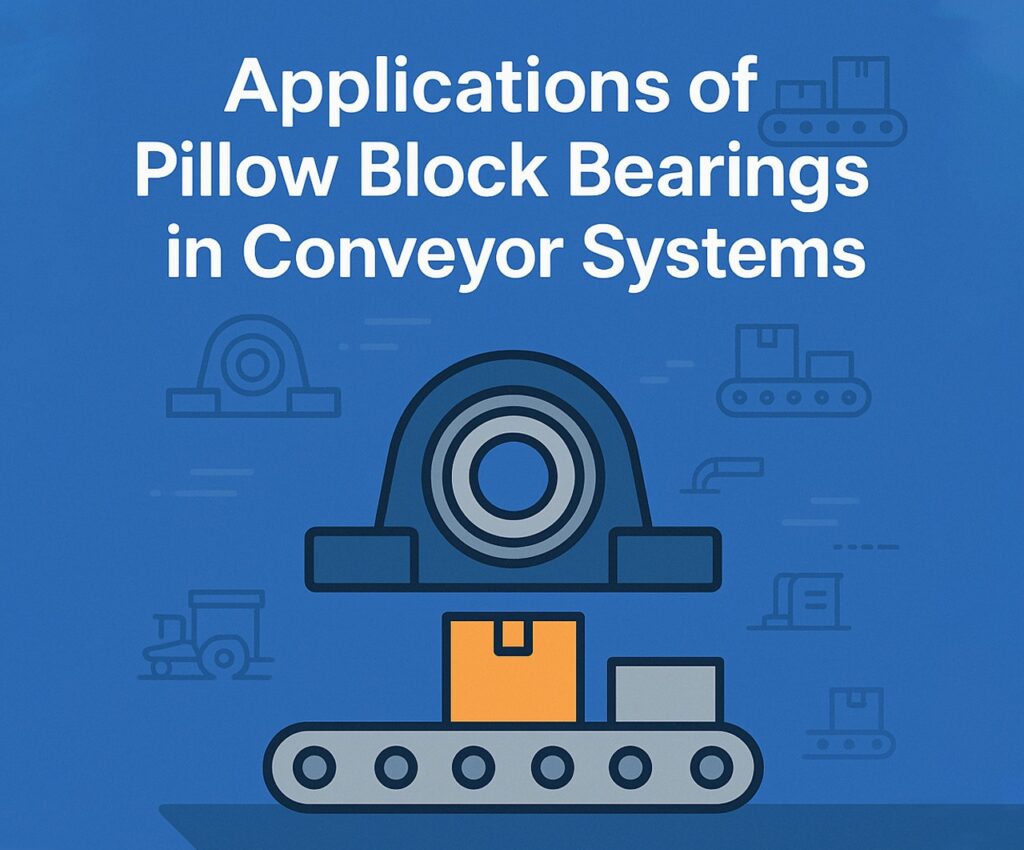Conveyor systems are the backbone of material handling across countless industries—from mining and manufacturing to logistics and food processing. At the heart of these systems are the components that keep them running smoothly and reliably. Among them, split pillow block bearing, 1 2 pillow block bearings, and heavy duty pillow block bearings play a critical role. These bearing assemblies not only support shafts and reduce friction but also absorb shocks, withstand high loads, and simplify maintenance. In this article, we’ll explore how different types of pillow block bearings are applied in modern conveyor systems and why choosing the right type matters more than ever. Know More
What Are Pillow Block Bearings?
A pillow block bearing, also known as a plummer block, is a mounted housing that contains a bearing insert. This assembly supports a rotating shaft and is bolted onto a flat surface—often the frame or base of a conveyor system. Pillow blocks are designed to make installation easy, enable simple alignment, and allow for bearing replacement without removing the entire shaft.
There are various types of pillow block bearings tailored for different use cases:
- Split pillow block bearing allows for quick assembly and disassembly, ideal for heavy machinery.
- 1 2 pillow block bearings refer to pillow block units for 1/2-inch shafts, commonly used in light-duty or compact conveyor systems.
- Heavy duty pillow block bearings are engineered for demanding applications involving high loads, harsh environments, or continuous operation.
Why Conveyor Systems Need Pillow Block Bearings
Conveyor systems rely on smooth, consistent motion to transport materials efficiently. Bearings must:
- Support the rotating shafts that drive rollers or pulleys
- Handle axial and radial loads from belts or conveyed goods
- Resist wear from contaminants, vibrations, and shock loads
Without reliable bearings, conveyor belts can misalign, stall, or wear out prematurely. This leads to costly downtime and maintenance.
Applications of Split Pillow Block Bearing in Conveyors
A split pillow block bearing is made of two separable halves, which simplifies mounting and inspection. In conveyor systems, they are ideal for:
1. Mining and Quarry Conveyors
These industries demand robust components that withstand dust, dirt, and high loads. The split housing design makes it easy to replace the bearing insert without disassembling the shaft or motor couplings—critical for minimizing downtime.
2. Steel and Cement Plants
Long conveyor belts in these facilities operate continuously. Split pillow block bearing units can be serviced quickly, ensuring 24/7 productivity with minimal interruption.
3. Bulk Material Handling
Whether it’s grains, gravel, or chemicals, conveyors handling bulk materials benefit from split housings that allow for easier lubrication, adjustment, and inspection.
The strength and serviceability of split housings make them the go-to choice for conveyor systems with long shafts and heavy pulleys.
Role of 1 2 Pillow Block Bearings in Compact Conveyors
Despite their small size, 1 2 pillow block bearings are essential in tight or lightweight applications where space is limited. Common uses include:
1. Packaging Conveyors
Small shafts that drive narrow belt conveyors in packaging lines rely on compact bearings. These 1/2-inch pillow block units are easy to install and maintain, offering precise rotation with minimal play.
2. Food and Beverage Processing
Compact conveyors in food lines often require stainless steel or thermoplastic pillow blocks to ensure hygiene and corrosion resistance. 1 2 pillow block bearings made from food-grade materials meet FDA or USDA standards.
3. Automated Warehouses
In systems with dense roller configurations or robotic transfer units, 1 2 pillow block bearings help facilitate tight turns, fast stops, and reliable motion in small-scale conveyors.
These bearings prove that size doesn’t limit performance—they’re critical for high-precision, low-profile conveyor applications.
Heavy Duty Pillow Block Bearings: Built for the Extreme
For the harshest conditions, heavy duty pillow block bearings are engineered to handle high torque, variable speeds, and shock loading. Their features include:
- Thicker housings
- Larger load zones
- High-grade seals to prevent ingress
- Extra-large grease reservoirs for longer lubrication intervals
Key Conveyor Applications:
1. Aggregate and Asphalt Production
Conveyors in these industries move tons of abrasive material every hour. Heavy duty pillow block bearings provide the strength and sealing required to survive these aggressive environments.
2. Lumber and Sawmill Lines
Chains and belts transporting heavy logs demand bearings that can take repeated impact without fatigue. Heavy-duty designs absorb stress and maintain alignment.
3. Airport Baggage Handling Systems
High uptime is critical. Bearings must handle variable weights, fast speeds, and 24/7 operation. Heavy duty pillow block bearings are trusted for their reliability and low maintenance needs.
These units are designed to go the distance—and in many cases, outlive the conveyor itself when properly installed and maintained.
Key Factors in Choosing the Right Pillow Block Bearing for Conveyors
1. Load Capacity
Consider the radial and axial loads expected during operation. Heavy duty pillow block bearings are the best fit for conveyors with heavy or uneven loads.
2. Environmental Conditions
- Split pillow block bearing options are preferred in dusty, dirty, or abrasive environments due to ease of service.
- Stainless or polymer 1 2 pillow block bearings work best in washdown or sterile environments.
3. Ease of Maintenance
If bearing access is limited, select units with grease fittings or split housings for easier service.
4. Speed and Shaft Size
Ensure the bearing matches the shaft diameter and rotational speed. Oversized or undersized bearings can cause misalignment and failure.
5. Mounting Surface and Housing Material
Choose pillow blocks with housing materials compatible with your conveyor frame—cast iron for heavy loads, thermoplastic for corrosion resistance, and stainless steel for hygiene.
Tips for Maximizing Bearing Life in Conveyor Systems
- Follow lubrication schedules for each bearing type.
- Avoid over-tightening mounting bolts—this can distort the housing.
- Use proper alignment tools during installation.
- Keep seals clean and intact to prevent contamination.
- Monitor vibration or noise as early indicators of wear or misalignment.
Preventive maintenance is key. Even robust heavy duty pillow block bearings benefit from regular inspection and lubrication.
Final Thoughts
Pillow block bearings are the unsung heroes of conveyor systems, quietly supporting motion under pressure, vibration, and continuous use. Whether you’re installing a compact 1 2 pillow block bearing in a packaging line or a rugged split pillow block bearing in a mining conveyor, understanding your system’s demands will lead to better bearing performance and longer system life.
For high-load, high-performance conveyors, heavy duty pillow block bearings provide the resilience and durability needed to keep operations moving. Select wisely, maintain consistently, and your conveyor systems will run smoother, longer, and more efficiently.

